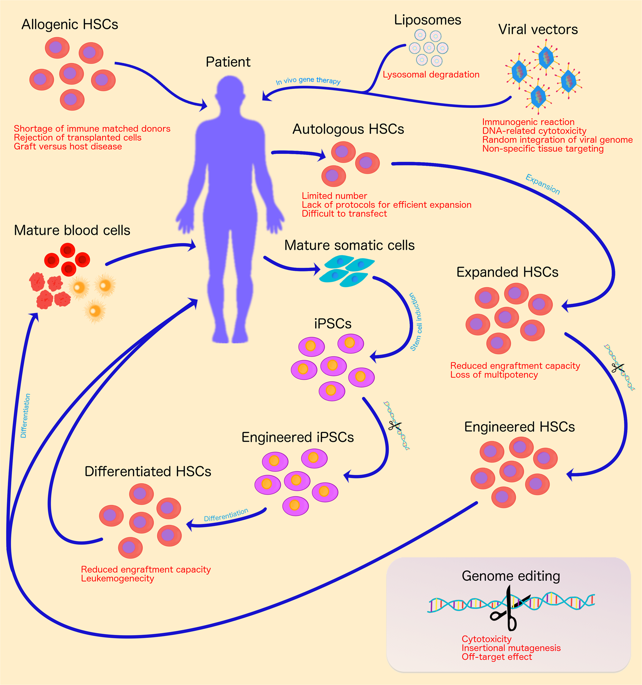当前位置:
X-MOL 学术
›
Gene Ther.
›
论文详情
Our official English website, www.x-mol.net, welcomes your
feedback! (Note: you will need to create a separate account there.)
Gene therapy of hematological disorders: current challenges.
Gene Therapy ( IF 4.6 ) Pub Date : 2019-07-12 , DOI: 10.1038/s41434-019-0093-4 Amr M Al-Saif 1
Gene Therapy ( IF 4.6 ) Pub Date : 2019-07-12 , DOI: 10.1038/s41434-019-0093-4 Amr M Al-Saif 1
Affiliation

|
Recent advances in genetic engineering technology and stem cell biology have spurred great interest in developing gene therapies for hereditary, as well as acquired hematological disorders. Currently, hematopoietic stem cell transplantation is used to cure disorders such as hemoglobinopathies and primary immunodeficiencies; however, this method is limited by the availability of immune-matched donors. Using autologous cells coupled with genome editing bypasses this limitation and therefore became the focus of many research groups aiming to develop efficient and safe genomic modification. Hence, gene therapy research has witnessed a noticeable growth in recent years with numerous successful achievements; however, several challenges have to be overcome before gene therapy becomes widely available for patients. In this review, I discuss tools used in gene therapy for hematological disorders, choices of target cells, and delivery vehicles with emphasis on current hurdles and attempts to solve them, and present examples of successful clinical trials to give a glimpse of current progress.
中文翻译:

血液疾病的基因治疗:当前的挑战。
基因工程技术和干细胞生物学的最新进展激发了人们对开发遗传性和获得性血液病基因疗法的极大兴趣。目前,造血干细胞移植用于治疗血红蛋白病和原发性免疫缺陷等疾病;然而,这种方法受到免疫匹配供体的可用性的限制。使用自体细胞结合基因组编辑绕过了这一限制,因此成为许多旨在开发高效和安全基因组修饰的研究小组的重点。因此,近年来基因治疗研究取得了显着的增长,并取得了许多成功的成果。然而,在基因治疗广泛应用于患者之前,必须克服一些挑战。在这次审查中,
更新日期:2019-11-18
中文翻译:

血液疾病的基因治疗:当前的挑战。
基因工程技术和干细胞生物学的最新进展激发了人们对开发遗传性和获得性血液病基因疗法的极大兴趣。目前,造血干细胞移植用于治疗血红蛋白病和原发性免疫缺陷等疾病;然而,这种方法受到免疫匹配供体的可用性的限制。使用自体细胞结合基因组编辑绕过了这一限制,因此成为许多旨在开发高效和安全基因组修饰的研究小组的重点。因此,近年来基因治疗研究取得了显着的增长,并取得了许多成功的成果。然而,在基因治疗广泛应用于患者之前,必须克服一些挑战。在这次审查中,











































 京公网安备 11010802027423号
京公网安备 11010802027423号